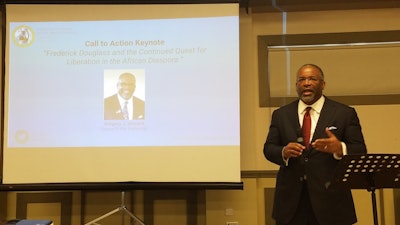DUBLIN—Although Frederick Douglass has emerged as a prominent figure in United States history, many are unaware that the former slave who would go on to become a staunch abolitionist, orator and author, spent several months in Ireland proclaiming that his time here produced “some of the happiest moments of [his] life.”
Born in 1818, this year the world is celebrating the bicentennial birthday of Douglass who has become one of the most recognized and important Black leaders in history. And that celebration was also the focus of the 7th annual International Colloquium on Black Males in Education, where Douglass’ life and work was critically examined by Dr. Gregory J. Vincent, who is the CEO and Chairman of Sigma Pi Phi, also known as the Boulé. 
The international fraternity founded in Philadelphia in 1904 was a co-sponsor of this year’s colloquium that brought scholars and practitioners who study and work with Black males to Ireland for a four-day convening.
“Given some of our weaker Black history, one person we did learn about was Frederick Douglass,” said Vincent who delivered the keynote address at the colloquium on Friday. “He is someone who we know. And why? Because for me he sets both the moral tone, but also was the precursor for so much of the work that we even do today.”
Vincent said that like Douglass, those who care about social justice and the plight of young Black males have to talk “plainly and clearly” about the issues that impact this demographic, adding that “the only way we’re going to have a laser focus on the issues at hand, we have to not sugar coat who and what we are.”
Douglass started his life, not as a free person but as a slave, said Vincent, adding that “he did not have any rights in the Dred Scott decision that any White person had to respect. He was chattel.”
As such, he broke the law when he ran away and was subject to fugitive slave laws that sought to return him to his master.
















